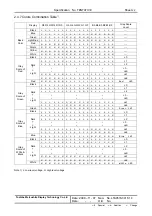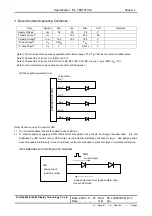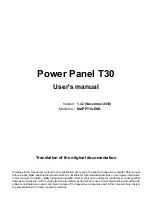
Specification No. TENTATIVE
Sheet
8
Toshiba Matsushita Display Technology Co.,Ltd
Date: 2008 – 11- 07
Date: - -
New No. LTA057A341F-14
Old No.
←
# Special
←&
Addition
←
Change
∗
3) WIPING OFF DUST ON THE PANEL
When LCD panel becomes dirty, wipe the panel surface off softly with absorbent cotton or another soft cloth.
If necessary, breathe upon the panel surface and then wipe off immediately and softly again.
Be careful not to spill organic solvents into the inside of LCD module. The organic solvents may damage driver IC
and PCB area used inside module.
The polarizer laminated to LCD panel and adhesives may be damaged by organic the solvents, so do not use any
organic solvents for wiping off LCD panel.
4)
PROTECTION AGAINST ADHESION OF ADHESIVE OR GREASE ON A DISPLAY
Be careful not to attach adhesive or grease etc. used for the assembly of a set on a LCD module display.
It is difficult to remove them without damaging display quality.
∗
5) WATER DROP ON A DISPLAY
Do not leave water drop attached on a display. When water drop etc. is attached, wipe it off with absorbent cotton or
soft cloth etc. immediately. If it is left without wiped off, a display discolors, or it causes spots. Moreover, moisture’s
infiltration into the inside causes failures.
6)
HANDLING IN THE CORROSIVE ATMOSPHERE
Do not blow gas or do not use a LCD module beside the normal atmosphere. It may cause failures.
3-4 BENDING / TWISTING OF LCD MODULE UNDER ASSEMBLY
1) INSTALLING LCD MODULE TO THE ENCLOSURE
Do not bend or twist LCD module even momentary when LCD module is installed into an enclosure of the system.
Bending or twisting LCD module may cause its damages.
2) FASTENING SCREWS
Fasten equally screws, which attach a module in a set,. If not fastened equally, temporarily warping or twisting of the
LCD module may cause failures.
3) FOR PREVENTION OF CATCHING CABLES
Be careful not to let cables etc. for interface caught between a set enclosure and a LCD module while assembling a
LCD module in a set.
Assembling with cables caught in may cause bending, twist of a LCD module, or damage and failure of cables.
3-5 MECHANICAL FORCES
∗
1) STRONG MECHANICAL SHOCK
Avoid strong mechanical shock, such as dropping the LCD from the work bench, or knocking it against a hard object.
These may cause the glass panel to crack, or cause other mis-operation.
∗
2) EXCESSIVE FORCE
Avoid applying excessive force, like pushing the surface of LCD panel. This may cause scratches or breakage of
the panel, or a failure of the module.










































